The Scene
Steve Blank has been at the center of integrating technology into American defense systems since the 1970s. He maintained electronic warfare equipment during the Vietnam War, worked at Silicon Valley startups focused on countering the Soviet Union, and co-founded Stanford University’s Gordian Knot Center on defense sector innovation.
But Blank is alarmed today by what he sees as the Pentagon’s sluggish response to the threat posed by China and failure to quickly embrace new technologies in its weapons systems and doctrines. He told Semafor in an interview that the U.S.’s global dominance over the past 75 years, and the systems developed and maintained to support it, is precisely what’s limiting Washington’s ability to adapt to the post-Cold War era and innovate.
“There’s a penalty being the number one superpower … because we’re so invested in all these legacy systems,” he said. “So, the legacy is both equipment and doctrine and concepts.”
Blank said the U.S. defense establishment must move quickly on three fronts over the next 12 months to signal its willingness to respond to the growing assertiveness of China, Russia, and their allies. These are:
- The U.S. government’s creation of a civilian structure to better pair the Pentagon with high tech startups and venture capital, particularly in areas like shipbuilding in which China is now dominant.
- A force redesign for the U.S. Navy to allow it to fight high-tech battles in Asia and the Pacific.
- A greater U.S. government willingness and ability to counteract information operations he sees being run by Beijing and Moscow to divide American public opinion on key national security issues.
“We won’t have time to do what we did after Pearl Harbor,” Blank said in reference to a potential war with China over Taiwan or other allied countries and regions in the Indo-Pacific. “You know, this war might be over in 90 days.”
Blank’s focus on defense innovation isn’t theoretical. He advises defense tech startups, such as Anduril Industries, and is an investor in Shield Capital, a fund that makes investments in national security. Blank says a number of his Stanford students are also working now in defense tech. “In the last couple of years, you know, we’ve gone from almost no VCs investing in dual-use companies to now … a bunch of others now are writing checks for dual-use startups.”
This interview was edited for length and clarity.
The Interview
Jay Solomon: How does Silicon Valley see China’s military buildup?
Steve Blank: It turns out that tech startups understand what the hell’s going on in the South China Sea a lot better than the Navy does. Tech startups are basically saying, look: You put all your eggs in carrier strike groups, which worked for 75 years [in] the way to project power and protect sea lanes and protect amphibious landings. China has built for the last 15 years a sort of asymmetric way to counter that.
Jay Solomon: What lessons have you taken from the Ukraine war?
Steve Blank: I looked at the lessons of Ukraine and said, you know, those drones, not only the air-to-ground drones, but the naval drones, are lessons learned for everybody. Asymmetric cheap weapons, and distributed ones, are going to be a major game changer.
Jay Solomon: Why are you so concerned about the Navy?
Steve Blank: Well, that looks a lot like the Navy in the 1960s. Where are we spending the bulk of our money and building the Navy that’s ready for the 21st century? And the answer is, we’re not, because people haven’t made the same tough choices.
Jay Solomon: How vulnerable is the Pentagon in the Pacific?
Steve Blank: You know our air assets were designed for short range. So, if you pull those carriers back past the first or second island chains, you don’t have long range strike. F-35s and F-18s don’t have those long legs, that’s not what they were designed for. They were designed for relatively close-in fights.
Jay Solomon: How do you think China is looking at Taiwan today?
Steve Blank: Those exercises [China’s] been running around the island were tests of both how Taiwan will respond, but also, you know, training their staff if they decide to take one of those isolated islands. They’ll be measuring. That’ll be their version of Crimea in 2014. What will the world do when they invade Taiwan’s sovereignty? Will the world do anything about that little nibble?
Jay Solomon: Is the U.S. hamstrung by being the global leader for so long?
Steve Blank: There’s a penalty being the number one superpower … because we’re so invested in all these legacy systems. So, the legacy is both equipment and doctrine and concepts … We have, you know, 75 years of sunk costs, not only in equipment, but operational concepts.
Jay Solomon: What do you see as the fallout from China taking Taiwan?
Steve Blank: This might be a 10-day war. That’s what’s different … So then you think about the consequences, what happens? Well, at worst, South Korea and Japan are now neutral, right? It’s no longer an American lake. So, it’s probably the Philippines [that breaks from Washington] and then the U.S. is spending the next three years going through economic recovery.
Jay Solomon: How is Silicon Valley evolving as tensions with China rise?
Steve Blank: I’d say in the last five, definitely, the last three years, a massive acceleration. There’s also a change in the student body, and Silicon Valley itself, from like: ‘We take Chinese money’, to now, ‘that’s poison’. Not just in military companies, but even in startups. It’s looked at like: Why would you do that?


